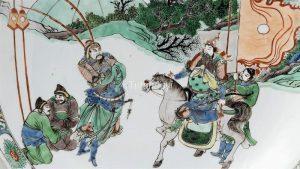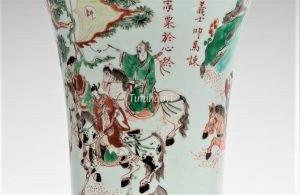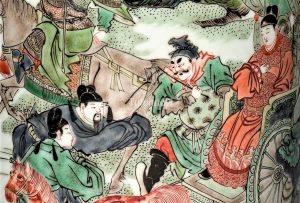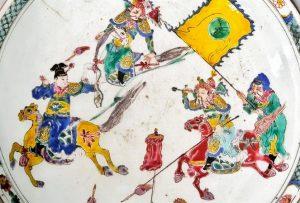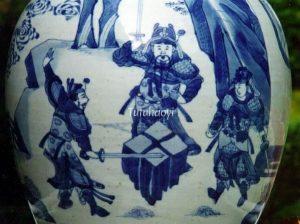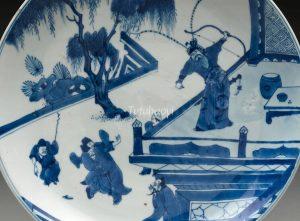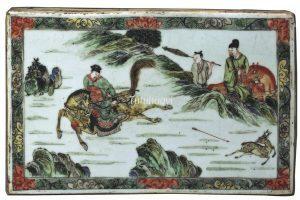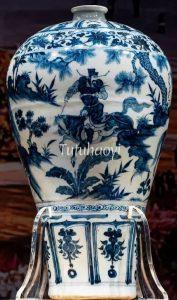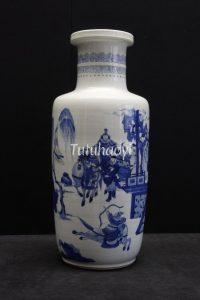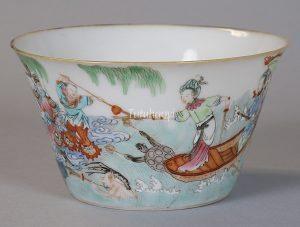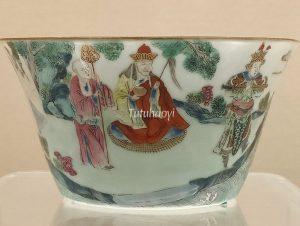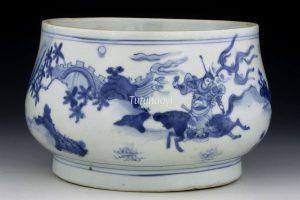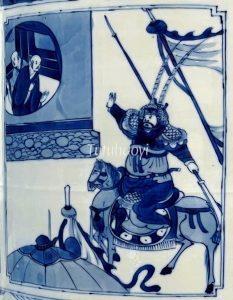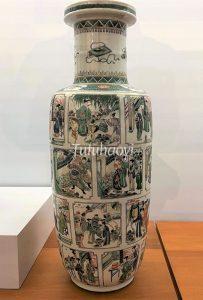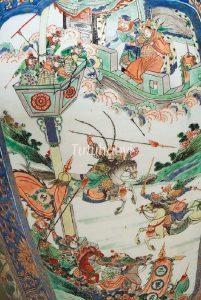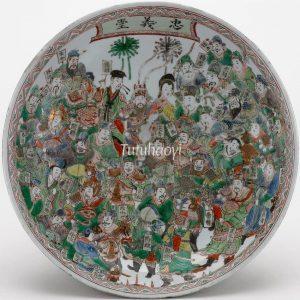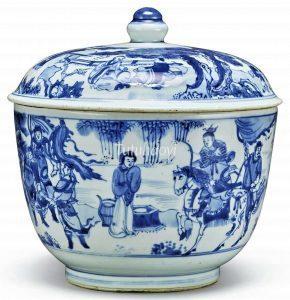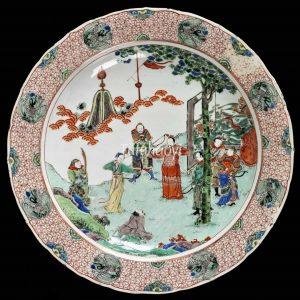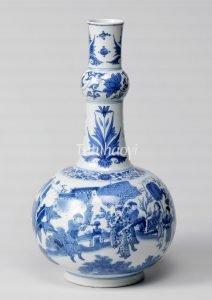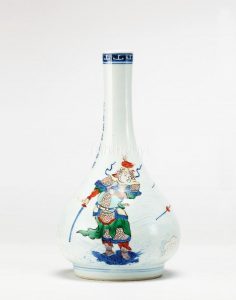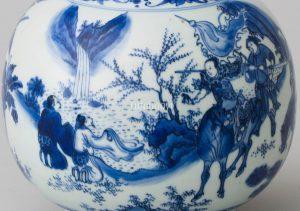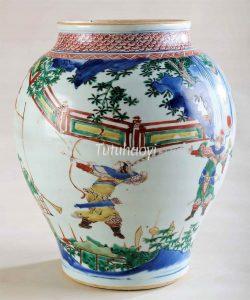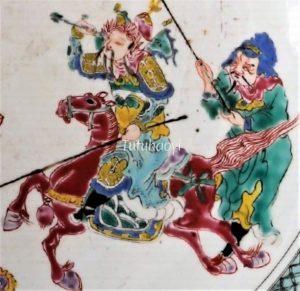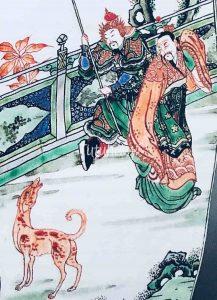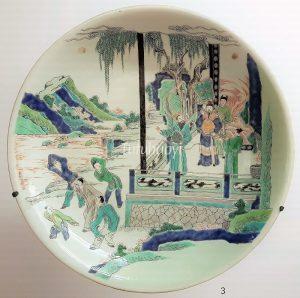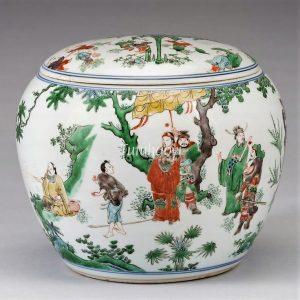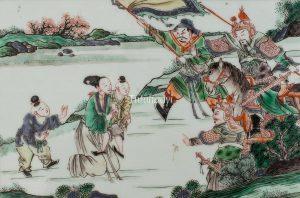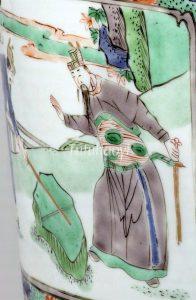Showing Results Containing
General Guo Ziyi deterring the mighty enemy has been a famous event in ancient China around mid-8th century. Deciphering this story scene on Chinese porcelain plates and tiles, however, has not been straightforward and has taken iconography specia...
The following article is a discussion of the substitution of a mythical beast for a horse as Grand Duke Jiang’s mount on three classic porcelain vases adorned with the same story scene of ‘Bo Yi and Shu Qi Trying to Stop the Mighty Zhou Army’. It ...
Through analysing a famous theme that depicts Bo Yi and Shu Qi Stopping the Zhou Army, Dr Yibin Ni has compared a number of porcelain vessels from Ming and Qing dynasties, and demonstrated his unique insight which can facilitate the correct dating...
Xiahou Dun, a heroic soldier in ancient China, was famous for his one-eyed appearance. Let’s appreciate how Dr Yibin Ni analyses the artistic presentation of this character on Chinese antique porcelain, woodblock print and other art forms, in asso...
Do you wonder why two warriors are waving swords over a rock that looks like a cross bun? Let Dr Yibin Ni demystify this enigmatic scene for you, which illustrates the old Chinese saying ‘bedfellows dream different dreams’!
Story scenes painted on Chinese porcelains are sometimes mysterious and challenging to understand. Dr Yibin Ni, whose specialised research is to demystify figures and story scenes, and decode motifs, symbols and pun rebuses in Chinese art, is here...
The Royal Hunt at Xutian is a pivotal moment in Chapter 20 of Romance of the Three Kingdoms (《三国演义》) by Luo Guanzhong (罗贯中). This episode highlights Cao Cao (曹操) as a domineering minister who ‘held the emperor hostage to command the feudal lords.’
In this scene, Cao Cao arranges a hunting...
The story comes from the Records of the Grand Historian (Shiji 史记), specifically the biography of the Marquis of Huaiyin. It recounts an episode from 206 BCE, during the power struggle between the Chu and Han kingdoms.
Han Xin 韩信, well-versed in military strategy, joined Liu Bang 刘邦 duri...
This scene is taken from Vol. 24 of the 14th-century Chinese historical novel Romance of the Three Kingdoms (三国演义 Sanguo Yanyi).
In the 15th year of Jian’an (AD 210), Cao Cao (曹操) completed the construction of Bronze Sparrow Terrace in Ye City (modern-day Handan, Hebei Province, China). To cele...
Nezha (哪吒) is a legendary warrior deity in Chinese mythology, known for his rebellious spirit, supernatural abilities, and deep connections to Daoist and Buddhist traditions. His earliest roots can be traced to Buddhist texts, where he appears as a guardian under Vaiśravaṇa, the Heavenly King (多闻天王, Duowen Tianwang). Ove...
The Legend of the White Snake is one of China’s four great folktales, the others being Lady Meng Jiang, Butterfly Lovers, and The Cowherd and the...
The true name of Guiguzi (鬼谷子) remains unknown due to insufficient historical records, although some suggest the name ‘Wang Yi’. Legend has it that Guiguzi was a figure from the Warring States period (475–221 BCE), renowned as both a recluse and a political thinker, strategist, and Daoist. He is considered the founder of...
According to the ‘Account of Zhao Yun’ (赵云传) in ‘The Records of the Three Kingdoms’ (三国志), Zhao Yun (styled Zilong, 子龙) was a distinguished general serving under his warlord, Liu Bei 刘备. It is said that Zhao was not only handsome and sturdy-built, but also brave and skilled in battle. In Chapters 41 to 42 of ‘Romance of ...
This is Scene One of Act Two of the Chinese classic popular drama Romance of the Western Chamber (西厢记 Xixiang Ji), written by the Yuan playwright Wang Shifu (125...
The Chinese classic drama Romance of the Western Chamber (西厢记) depicts a romantic story of a young couple in the Tang dynasty. The name of the play has also been translated into The Story of the Western Wing, The West Chamber, and Romance of the Western Bower, etc. It stands as one of ...
Qin Shubao (秦叔宝, or Qin Qiong 秦琼, ?–638,) and Luo Cheng 罗成 were cousins, and they were characters in the Qing Dynasty novel Complete Biography of Explaining the Tang Dynasty 《说唐演义全传》 (Shuo Tang Yanyi Quan Zhuan, author unknown).
Luo Cheng was invited by General Yang Yichen 杨义臣 to guard an extremely diffic...
Water Margin, also known as Outlaws of the Marsh or All Men Are Brothers, is a classic Chinese novel written during the Ming Dynasty. It is considered one of the Four Great Classical Novels of Chinese literature.
The authorship of the Water Margin has always been a subject of de...
This scene was from a popular play ‘The Story of the White Hare’ (Bai Tu Ji 白兔记) and was much admired during the Ming dynasty.
Liu Zhiyuan 刘知远, the hero of the play set during the turbulent Five Dynasties (907–960), became an orphan when he was a teenager. His affluent neighbour looked after him and later...
Guo Ziyi (郭子仪 697–781), posthumously bestowed the title Prince Zhongwu of Fenyang (汾阳忠武王) because of his birth place and his contribution to the court, was the greatest Tang-dynasty general. He played the key role in military campaigns against the Uyghur Khaganate and Tibetan Empire, enemies constantly threatening China ...
This is a story of a brave woman who boldly exercised her rhetorical competence, managed to correct the erring ruler and saved her husband from execution. The story of The Wife of the Bow Maker in the State of Jin (晋弓工妻) is recorded in Chapter 6 Convincing and Perceptive (辩通传), Biographies of Exemplary Women (列女...
The main figure in the scene is a dignitary, often gripping a hu (笏) tablet in his hands, which an official uses to take notes when he has audience with the emperor in court. He is usually sheltered by page boys erecting some fans or a parasol or guarded by a soldier holding a weapon with an iron melon on the to...
When Prefect Mao Bao 毛宝 was stationed in the city of Wuchang 武昌, Hebei province, during the Jin dynasty (晋 265-420), there was a story about a white tortoise who repay...
Bo Yi (or Boyi, 伯夷) and Shu Qi (or Shuqi, 叔齐) were sons of the ruler of Guzhu (孤竹), a vassal state of the Shang dynasty (商朝, 16th-11th cent. BCE). As the king was getting old, he wanted Shu Qi, his youngest son, to inherit his throne. However, when the father died, Shu Qi asked Bo Yi to take over th...
Lv Bu (吕布 Lü Bu, died 199 CE) is known as an almost unchallenged fighter in the period of the Three Kingdoms (三国, 220-280 CE) in Chinese history. The scene on the vase depicts a crucial moment when Lv Bu’s exceptional archery stunt astounded all the generals and soldiers present and then successfully quelled an ...
Xiahou Dun (夏侯惇, died 13 June 220) was one of Cao Cao’s (曹操, 155-220) most valued generals in the late Eastern Han dynasty (东汉, 25-220) of China. Xiahou showed his strong temperament even when he was in his early teens. Once his mentor was insulted, and he went straight to the insulter and killed him. During the 190s in ...
When the old duke of Jin (晋) passed away, his heir was still in the cradle. It was with the powerful minister Zhao Dun (赵盾)’s support that he succeeded in ascending the throne. Unfortunately, the young duke, who was posthumously given the title Duke Ling of Jin, Jìn Líng Gōng (晋灵公, ? – 607 BCE), became increasingly the o...
The young duke of the State of Jin (晋) who was posthumously given the title Duke Ling of Jin, Jìn Líng Gōng (晋灵公, ? – 607 BCE), has been known as a ‘ruler who does not deserve his title (bu jun 不君)’. His despotic behaviour was enumerated in the records by historiographers. For example, he levied heavy taxes to b...
When the Baron of the Zhou vassal state (周西伯) did a divination with oracle bones for his imminent hunting trip, the message came: ‘You will not catch a small bear or a large bear, but a teacher will be presented to you by the divine power.’ After bathing and fasting for three days, the baron arrived at the River Wei, he ...
This is a story of a righteous woman. As the army of the state of Qi (齐国) launched an invasion against the state of Lu (鲁国), soldiers approaching a Lu suburb saw a woman struggling along the road with two children. When the army got closer, she abandoned one of the children and grabbed the other, moving toward the mounta...
In the 14th-century historical novel, Romance of the Three Kingdoms (三国演义 – 甘露寺招亲), the generals in the Dongwu (东吴) kingdom conspired to murder Liu Bei (刘备), head of the Shu Han (蜀汉) kingdom, by inviting him to their territory with the promise of their king Sun Quan (孙权)’s sister for his wife. When Liu Bei...
